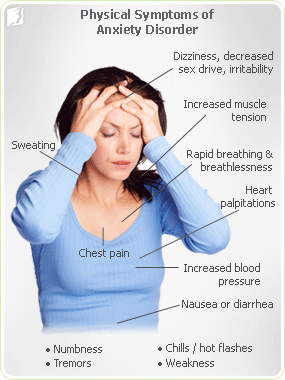Monday, February 15, 2016
Panic attacks,Symptoms
Panic attacks occur suddenly. The main symptoms of this overwhelming feeling of strong anxiety and fear. The heart starts beating at a dizzying pace, the man feels that he begins to suffocate. If left untreated, can lead to serious anxiety disorder. Sometimes even the cause of withdrawal from activities previously undertaken. However, panic attacks can be treated, and the sooner you'll take them, the better. Appropriate treatment can help reduce or completely eliminate symptoms and regain control of your life.
When there are panic attacks?
Many people with panic attacks appear out of nowhere. Not infrequently there is no clear his cause. They may even appear when we are relaxed or when we sleep.
A panic attack can be a one-off problem. It happens that one experiences it once and never again. However, for many people, it is a duplicate experiment. Recurring panic attacks are often caused by a very concrete specific situation, such as, for example, pass through the bridge or public speaking. Especially if such a situation has already caused a panic attack in the past. Usually, these are situations in which we feel in any way threatened or deprived of the opportunity to escape.
You may experience one or even a few panic attacks while being very happy and healthy person. It is also possible that they appear as part of a broader problem, such as social phobia, panic disorder or depression. However, regardless of the cause, panic attacks are treatable. There are plenty of effective treatments and coping strategies that can be used to combat symptoms.
Panic attacks, symptoms
Panic attacks occur frequently when you're away from home, but in fact, can occur anytime, anywhere. A full panic attack includes a combination of several of the following symptoms:
Palpitations, rapid heart rate
Shortness of breath, trouble breathing
The feeling of choking
Weakening or fainting, dizziness
Sweating
The sudden sensation of cold or hot
Pain in the chest
The fear of death, heart attack
Fear of insanity or loss of self-control
trembling
numbness of the limbs
paleness
nausea, indigestion or other unpleasant sensations in the abdomen
a sense of unreality or depersonalization (feeling of change of identity)
Symptoms of attack are growing very quickly and reach a climax usually after a few minutes. Rarely last longer than an hour, typically they pass within half an hour.
Heart attack or panic attack?
Most of these symptoms are physical symptoms. And because they tend to be very severe, many people are convinced that he has a heart attack. Often they repeated pilgrimages to the GP, cardiologist, or directly to the emergency room, trying to get help with their life-threatening medical problem. These visits are ineffective because the ailment is psychological, but usually, only after several attacks is revealed its true nature. Of course, it is very important to exclude possible medical causes of symptoms such as chest pain or heart palpitations. However, it often happens that it is the mental causes are unnoticed.
Subscribe to:
Post Comments (Atom)

No comments:
Post a Comment